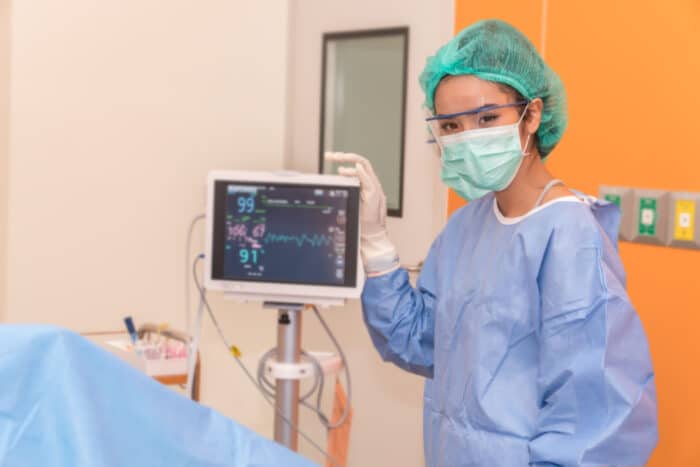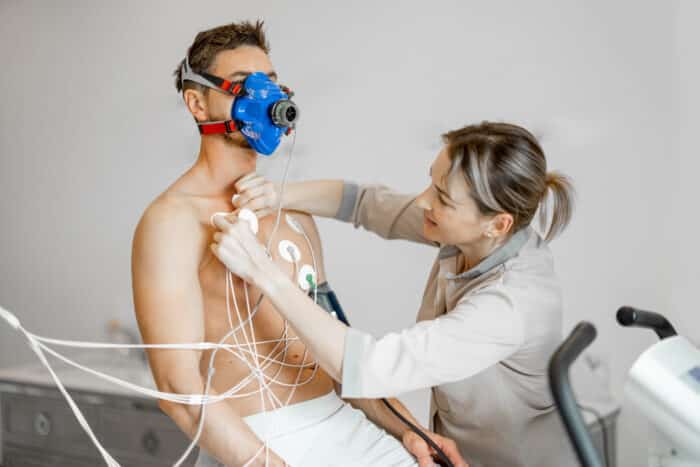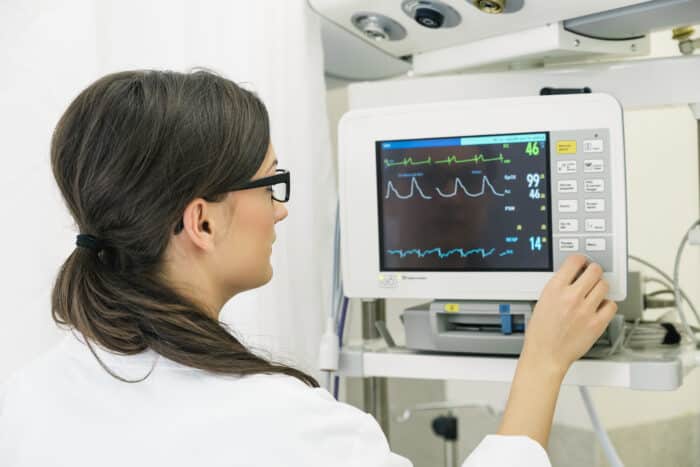The jobs for EKG Technicians are growing, and the U.S. Bureau of Labor Statistics has also reported an increase in job growth for EKG Techs by 8-10% in the coming years.
An EKG technician is a healthcare worker who is responsible for conducting and analyzing electrocardiogram tests.
If you’re interested in pursuing this career, you want to know where can you work and what are the different kinds of jobs. In this article, we cover all about that.
Types of EKG Technician Jobs
There are different types of EKG (electrocardiogram) technician jobs that you can opt for. As an EKG tech, you play a significant role in the healthcare industry by performing diagnostic tests to monitor and record the electrical activity of patients’ hearts.
Below mentioned are some of the EKG Technician Jobs:-
- Hospital EKG Technician: EKG Technicians who work in a hospital are expected to work in various departments, including cardiology, emergency rooms, and intensive care units. They help in conducting EKG tests on patients, interpret the results, and collaborate with doctors and nurses in providing patient care.
- Cardiology Clinic EKG Technician: These technicians work particularly in specialized cardiology clinics, where they are responsible for performing EKG tests as part of routine check-ups or diagnostic procedures. When a patient is admitted, they observe the EKG tracings in real-time, and in case they see any abnormalities, they immediately report to doctors or other senior healthcare professionals.
- Ambulatory Care EKG Technician: This job includes outpatient clinics, physician offices, and diagnostic imaging centers. EKG technicians in these settings conduct tests on patients who visit for different reasons, such as preoperative assessments or general health check-ups.
- Telemetry EKG Technician: Telemetry technicians are responsible for monitoring and interpreting patients’ heart activity remotely. They work in hospitals or specialized telemetry units and use advanced technology to transmit and analyze EKG data from patients and ensure the data is seamlessly being sent to a doctor or healthcare professional.
- Mobile EKG Technician: Mobile EKG technicians travel to different locations, such as nursing homes, assisted living facilities, and private residences, to perform EKG tests on patients who cannot easily visit healthcare facilities. They bring portable EKG machines and provide on-site testing and monitoring services.
- Research EKG Technician: In research settings, EKG technicians may be expected to get involved in clinical trials and studies related to cardiac health. They perform EKG tests on participants, collect data, and assist in analyzing and documenting the results under the supervision of researchers.
- EKG Instructor/Trainer: EKG technicians may also choose to pursue teaching roles. EKG Technicians as trainers can work as instructors in vocational schools, community colleges, or healthcare training programs.
Where do EKG Technicians Work?
EKG (electrocardiogram) technicians can be found working in various healthcare settings where cardiac monitoring and diagnostic tests are conducted. Some common places where EKG technicians work include:
- Hospitals: EKG technicians are mostly found in hospitals, including general hospitals, specialized cardiac hospitals, and university hospitals. They may be expected to work in departments such as cardiology, emergency rooms, critical care units, and telemetry units.
- Cardiology Clinics: The Cardiology Clinic is the second most common place where EKG Technicians assist cardiologists in diagnosing and treating heart conditions. These clinics tend to focus on specific cardiac specialties, such as arrhythmias, heart failure, or interventional cardiology.
- Outpatient Clinics: EKG technicians are also seen working in outpatient clinics, such as medical clinics, diagnostic imaging centers, and ambulatory care facilities. They conduct EKG tests as part of routine check-ups, preoperative assessments, or general cardiac evaluations.
- Physician Offices: Many doctors’ offices, particularly those with a cardiology specialization, employ EKG technicians to conduct initial screenings and monitor patients’ heart activity.
- Diagnostic Laboratories: EKG technicians can work in diagnostic laboratories that focus on cardiovascular testing. These labs tend to perform various cardiac diagnostic procedures, including EKGs, stress tests, Holter monitoring, and event monitoring.
- Mobile Testing Units: Some of the EKG technicians work in mobile testing units that provide on-site diagnostic services. Techs might visit nursing homes, assisted living facilities, and private residences to perform EKG tests on individuals who are unable to travel to healthcare facilities.
- Research Facilities: They may find opportunities in research facilities wherein clinical trials and studies related to cardiac health are conducted. EKG Technicians contribute to data collection, monitor participants’ heart activity, and assist in analyzing and documenting research results.
- Educational Institutions: Experienced EKG technicians may work in vocational schools, community colleges, or healthcare training programs as instructors or trainers. They educate and train aspiring EKG technicians while teaching them the necessary skills and knowledge to conduct EKG tests.
EKG Technician – Career Outlook
As mentioned earlier in this article, The Bureau of Labor Statistics (BLS) has reported an increase in job growth for EKG Technicians. Over the next 10 years, there’s an expected rise of 10% in the number of jobs for Cardiovascular Technologists and Technicians.
The average EKG Technician salary is reported to be upwards of $40,000 per hour. Technicians with over 5-10 years of experience can earn upwards of $55,000.
How to Earn More as an EKG Technician?
Many people fail to earn a decent wage as an EKG Technician, especially when they are starting their careers. Here are a few steps you can take to earn a better salary:-
Get Trained Faster with Online Programs
Though there are many options available for EKG Technician Training, pursuing an online program is highly recommended. With an online program, you can learn at your own pace, from your couch at home, and the tuition for these programs is significantly lower than full-time EKG Technician Schools.
But the best thing is you can complete an online program within months. This means you can start your career faster without the burden of student debt.
Look for Externships
It won’t be easy for you to settle in this industry by just knowing the theoretical part, but it’s crucial to know the practical aspects as well.
With externships, you can network with other EKG Techs and get some hands-on clinical experience under your belt.
Get Additional Certifications
When you’re finally done with your training programs, you can apply for CET certification. You have to sit for the exam, and when you clear that exam, you’re a Certified EKG Technician.
As a Certified EKG Technician, you have more credibility in the market and can get a great deal of job opportunities.
Prepare for your interview
Last but not least, you need to prepare for job interviews when you start applying for jobs. Even if you have the skills, you would be required to polish your interview skills to get the job.
And make sure you have a solid EKG Technician Resume.
Related:
Related Articles
-
How to Be Successful in College in 2022 – 7 Simple Tips to Succeed
-
How Do Scholarships Work? Read This First…Truth is Shocking
-
7 Best College Majors 2024: What Should I Major In?
-
How to Choose a College – 10 Things You Must Consider in 2024
-
Why Go to College? Top 13 Benefits for Adult Students in 2022
-
Top 5 Best Alternatives to Community College for 2024










